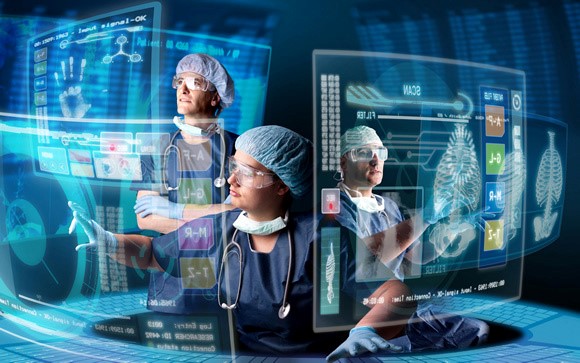
Specialists from different disciplines update on these changes at the Sanitas 2019 Forum, which has dealt with the “Disruption in Personalized Prevention Medicine”.
The application of technology has revolutionized the
concept of Medicine as we understand it today, however, we are in the prelude
to the next revolution that has already begun to occur in this field. Digital
biomarkers, artificial intelligence programs that will allow the development of
personalized medicines, and the new channels and services that 5G technology is
already allowing focus the disruptive changes that are taking place in the
so-called Digital Medicine.
That is
one of the great conclusions of the Sanitas Forum 2019, held in Madrid, and at
whose inauguration Iñaki Ereño, CEO of Sanitas, has stressed that technology is
the great “enabler that allows us to create a collaborative Medicine and seek
better Medicines, better diagnoses and better research so that people have
longer, healthier and happier lives”.
One of the topics of the first table of the 2019 Health
Forum, entitled ‘Disruption in Digital Medicine’, has been the possibilities
that 5G technology will allow in the healthcare field, mainly in the field of
surgery with remote interventions. The main advantages that it will bring is speed (around 500 - 600
megabytes per second, compared to the 40-70 we have with the 4G); the ability
to better use the spectrum that allows more data to be used; the latency or
response time that will be less than 5 milliseconds; and the multi-device, that
is, the unique devices that can be connected to a single antenna. This
last aspect is going to be key in the applications to Medicine, as the
mathematician Julia Velasco, director of Network Engineering at Vodafone, has
said in her speech.
The services that are demanded now are not very mobile or
much data, but they focus on combined services, and that is what 5G will allow
us to offer the type of service adapted to each application according to the
needs specific requirements. For
example, says Velasco, “if you want to do connected surgery, what you need is a
lot of data to have good image quality and low latency, if on the contrary what
is required is management and monitoring of the medication stock of a hospital
I just need many devices, so we can guarantee the quality of that service much
better”.
In the case of robotic surgery, what 5G can provide is
speed, allowing the extraction of the final computing data and bringing it to
the end user to the maximum, being able to transmit an instant communication in
2 milliseconds, Velasco explains. From Vodafone they have participated in a
robotic surgery mentoring experience with the Hospital Clínic de Barcelona that
allows an expert surgeon to instruct another who is not an expert in that
field, in real time, during an operation. The future is in remote surgery that
allows a robot to operate a patient receiving the orders of a surgeon located
3,000 kilometers away. A surgery that is already coming true in Asia.
Digital biomarkers
Another of the revolutions in Medicine is being carried
out by digital biomarkers. In this field, Juan Carlos Gómez, psychiatrist and
world head of Medical Science at Shionogi & Co., has talked about
innovation in Neuropsychiatry with portable devices, with everything they are
contributing to the world of mental health. He has focused on explaining two
areas that are especially relevant for the development of new drugs: digital
biomarkers and digital treatments and interventions.
With regard to digital biomarkers, these are based on the
use of sensors, passive or active, in mobile devices that the patient carries
over on a regular basis. "These
biomarkers give us a promise of objective measurements that we have lacked,
that are very sensitive, capable of capturing symptomatic fluctuations, with
ecological validity and that eliminate biases, both of the patient and the
clinician", the psychiatrist illustrates.
Digital
biomarkers allow the development of medications much more efficiently, as well
as monitoring the evaluation of patients, in a continuous way, in the usual
clinical practice. “This is an enormously promising area in the field of
treatment of patients in Neuropsychiatry such as those affected by some
autisms, schizophrenia”, concludes Gomez.
Digital treatments
The digital treatments of psychiatric conditions are
framed in the recommendations of all therapeutic guidelines on the need to, in
addition to pharmacological treatment, proceed with a psychotherapeutic or
psychosocial approach of patients.
In that field, digital applications can be very
beneficial. There are already experiences in development in this field. One of
them is a video game for the treatment of attention deficit disorder in
children, or a digital therapy to treat people with opioid abuse. "Of course", says Gómez,
"they must be digital treatments studied and backed up with scientific
literature, so that clinicians can prescribe them safely".
In this context, the psychiatrist has set as an example a
study published in Nature Digital Medicine in which 71 health applications in
mental illnesses were evaluated. Of these, 81 percent had no scientific
attributions, only two of them had controlled studies that supported their
results, and a single application had them referenced in a scientific journal.
For his part, Antonio Foncubierta, a member of
the research team at IBM Research, has explained some innovative applications
of artificial intelligence (AI) in personalized and precision medicine. An
artificial intelligence based on data, human-centered, explainable and
actionable. Depending on the data, we will have an AI for decision support
systems, for digital pathologies, for behavior analysis or for systems biology.
SOURCE: El Médico Interactivo
